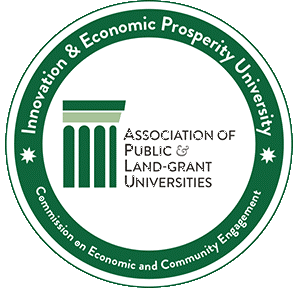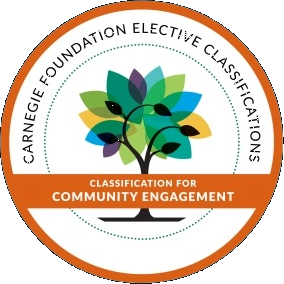The MSU Graduate Student Award for Science Communication and Outreach is conferred upon one graduate or graduate professional student each year for the exemplary translation and communication of scholarly ideas, research findings, and advancements in all academic disciplines.
This award program is jointly sponsored by the office of the Vice Provost for University Outreach and Engagement and the MSU Graduate School.
Eligibility
To be eligible for this award, nominees must meet all of the following criteria. Nominees are expected to:
- Be enrolled as a Master’s or Doctoral student in any one of Michigan State University’s 14 graduate degree-granting colleges, including the medical schools and law school. Individuals in post-doctoral training at MSU are not eligible for this award.
- Conduct science communication and/or research outreach activities while enrolled in graduate study at Michigan State University, though those activities may occur any place geographically, including internationally. While the work may be related to thesis or dissertation work, it is not a requirement. Science communication and outreach conducted as part of research or teaching assistantships, field studies or practicums, work activities, or volunteering are eligible, as long as those activities meet the requirements for this award.
- Exemplify effective communication and outreach practices for addressing a significant public need for accurate information, grounded in scholarship, appropriate to the context, and generative of positive impacts for both the public and the graduate student.
- A separate graduate student award for community-engaged scholarship has been established to recognize more highly collaborative, community partnership-driven projects/activities. Nominations of students whose work is more intensively collaborative in nature should be submitted for that award. Applying for both awards for the same project is highly discouraged.
Timeline
- Extended nomination deadline: November 20, 2025, 11:59 p.m. (Eastern)
- Nominees are informed of selection committee decision: January 2026
- Award is conferred at the University Outreach and Engagement Awards Ceremony: March 12, 2026
Nomination Instructions
Nominations should be initiated and completed by students. Faculty, administrators, community partners, or members of the general public are encouraged to assist the student in their application.
Only complete nominations comprised of all of the following elements will be considered:
- Nomination cover page (in the online nomination form)
-
Nomination narrative (maximum of 5 pages)
1-5 page text that describes the science communication and outreach project/activity. It should address:
- the specific scholarly information conveyed and why it is important to communicate it to people outside of the sciences
- the theories, conceptual frameworks, or best practices that guided the nominee’s communication and outreach methods
- who the intended audiences/participants are and how the nominee recognized and accommodated for their learning styles, ways of knowing, and education levels throughout the project/activity
- what happened in the project/activity
- what impacts the project/activity has had on the intended audiences/participants
- what impacts the project/activity has had on the nominee personally and professionally, including reflections or lessons learned
- Nominee’s resume or curriculum vitae
-
Nomination letter from the nominee’s major professor or faculty familiar with the nominee’s science communication and outreach (maximum of 2 pages)
1-2 page letter that should address the student’s contributions to science communication and scholarly outreach, including the significance of the information translated through the project/activity for the intended audiences/participants; the student's effectiveness in making information accessible to the public; characterization of the student’s relationship with community partners, if any; impacts to the audiences/participants; and impact on the student’s personal and professional learning.
This letter should be specific to the graduate student’s science communication and outreach and not a general letter of recommendation commenting on the student’s overall academic performance, accomplishments, or character.
-
Appendices/Supporting materials (maximum of 3 pages)
1-3 pages that illustrate the scope and impact of the work and/or provide evidence of its quality in conveying information effectively and appropriately for its intended audiences/participants. Could include such materials as: infographics or other public audience pieces produced through the project/activity; a list of links to newspaper articles, videos, blog posts, or podcasts that mention the work; photographs from project/activity (taken with permission); an additional letter from members of the public or a community partner; etc.
Nomination narrative, support letters, and appendices/supporting materials should comprise no more than 10 pages in total. The cover page and c.v. do not count in this 10-page limit.
All nominations must be submitted through the online Graduate Student Award for Science Communication and Outreach Nomination Form no later than November 20, 2025, at 11:59 p.m. (Eastern).
Questions
Prospective nominees, faculty, community partners, and interested others may direct questions about this recognition program to Julie Crowgey, crowgeyj@msu.edu.









